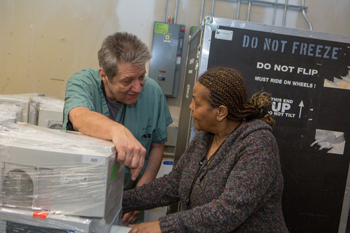Access to hemodialysis technology: From Toronto to Addis Ababa

By Kelly O’Brien

Terri Tessama, a cashier in the Marketeria, and Jim McDougall, the Operations Leader in the Clinical Engineering Department. Tessama and McDougall were part of a team that organized a donation of 30 home hemodialysis machines to the Kidney Failure Dialysis Charity Organization in Ethiopia. (Photo by Yuri Markarov)
As a cashier in the Marketeria, Tiruwork Tessama, better known as Terri, meets people from all over St. Michael’s Hospital at her till.
It was there that she met Elizabeth Anderson, the clinical leader manager of the Kidney Care Centre and Home Dialysis Clinic, and heard that the hospital was replacing its 30 home hemodialysis machines.
Tessama asked Anderson if she had thought of donating the old machines, and told her she knew of an organization based in Ethiopia that would take them.
“Many people in Ethiopia who need dialysis aren’t able to access it, either because of where they live or because it’s too expensive,” Tessama said. “I had heard about the problem through my church community, and when I heard Liz talking about the old machines I thought it would be a great way to help.”
Anderson reviewed the hospital’s policy and agreed to donate the 30 home hemodialysis machines to the Kidney Failure Dialysis Charity Organization in Addis Ababa, the capital of Ethiopia. A team from the Kidney Care Clinic and the hospital’s Clinical Engineering Department worked with Tessama to prepare the machines for use by patients and clinicians there.
“Terri presented us with a great opportunity to give back, and our team was more than happy to help,” said Anderson.
Did you know? In addition to the hemodialysis machines, the team is also donating 30 reverse osmosis machines, and other equipment needed for dialysis. If purchased new, the cost of each package would be roughly $30,000. |
Home hemodialysis machines are similar to those used in hospital, but are used less frequently and therefore have a longer life. Home machines are used an average of 12 hours a week, and in-hospital machines are used an average of 20 hours a day, said Anderson.
Once they arrive in Ethiopia, the machines will be used in clinics and hospitals in and around Addis Ababa.
In addition to the hemodialysis machines, the team is also donating 30 reverse osmosis machines and other equipment needed for dialysis. If purchased new, the cost of each package would be roughly $30,000.
“This is a very generous gift, and I can’t thank Liz and her team enough for making it happen,” said Tessama.
About St. Michael’s Hospital
St. Michael’s Hospital provides compassionate care to all who enter its doors. The hospital also provides outstanding medical education to future health care professionals in more than 29 academic disciplines. Critical care and trauma, heart disease, neurosurgery, diabetes, cancer care, care of the homeless and global health are among the Hospital’s recognized areas of expertise. Through the Keenan Research Centre and the Li Ka Shing International Healthcare Education Centre, which make up the Li Ka Shing Knowledge Institute, research and education at St. Michael’s Hospital are recognized and make an impact around the world. Founded in 1892, the hospital is fully affiliated with the University of Toronto.
